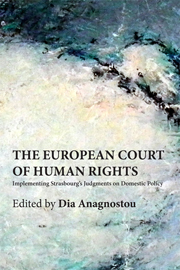Book contents
- Frontmatter
- Contents
- The contributors
- Acknowledgements
- Introduction: Untangling the domestic implementation of the European Court of Human Rights' judgments
- Part I INSTITUTIONAL DYNAMICS OF DOMESTIC IMPLEMENTATION
- Part II LEGAL MOBILISATION AND THE POLITICAL CONTEXT OF IMPLEMENTATION
- 4 European human rights case law and the rights of homosexuals, foreigners and immigrants in Austria
- 5 Political opposition and judicial resistance to Strasbourg case law regarding minorities in Bulgaria
- 6 Under what conditions do national authorities implement the European Court of Human Rights' rulings? Religious and ethnic minorities in Greece
- 7 A complicated affair: Turkey's Kurds and the European Court of Human Rights
- 8 The European Court of Human Rights and minorities in the United Kingdom: catalyst for change or hollow rhetoric?
- 9 Politics, courts and society in the national implementation and practice of European Court of Human Rights case law
- List of European Court of Human Rights judgments and European Commission on Human Rights cases
- Index
4 - European human rights case law and the rights of homosexuals, foreigners and immigrants in Austria
from Part II - LEGAL MOBILISATION AND THE POLITICAL CONTEXT OF IMPLEMENTATION
Published online by Cambridge University Press: 05 April 2014
- Frontmatter
- Contents
- The contributors
- Acknowledgements
- Introduction: Untangling the domestic implementation of the European Court of Human Rights' judgments
- Part I INSTITUTIONAL DYNAMICS OF DOMESTIC IMPLEMENTATION
- Part II LEGAL MOBILISATION AND THE POLITICAL CONTEXT OF IMPLEMENTATION
- 4 European human rights case law and the rights of homosexuals, foreigners and immigrants in Austria
- 5 Political opposition and judicial resistance to Strasbourg case law regarding minorities in Bulgaria
- 6 Under what conditions do national authorities implement the European Court of Human Rights' rulings? Religious and ethnic minorities in Greece
- 7 A complicated affair: Turkey's Kurds and the European Court of Human Rights
- 8 The European Court of Human Rights and minorities in the United Kingdom: catalyst for change or hollow rhetoric?
- 9 Politics, courts and society in the national implementation and practice of European Court of Human Rights case law
- List of European Court of Human Rights judgments and European Commission on Human Rights cases
- Index
Summary
After regaining its full sovereignty through the Austrian State Treaty in 1955, Austria joined the Council of Europe (CoE) as its fifteenth member state on 16 April 1956. Accession to the European Convention for the Protection of Human Rights and Fundamental Freedoms (ECHR or the Convention) was politically undisputed and perceived as a mere act of European solidarity. Both the government and the judiciary were of the opinion that fundamental rights were already sufficiently guaranteed within the domestic legal order. Therefore, the ratification of the Convention was not considered to have any substantial consequences. It came as a surprise when soon afterwards, a relatively large number of applications were lodged against Austria before the European Court of Human Rights (ECtHR or the Court).
Austria was the first state to fully incorporate the ECHR into its constitutional legal order. This created a high level of awareness of the legal and practical implications of the Convention within Austrian society, as well as the influence exerted by the Strasbourg Court. From 1985 to 2007 about ninety decisions and judgments of the ECtHR were issued against Austria that pertained to the core civil and political rights of members of marginalised groups, including foreigners, ethnic or religious minorities and homosexuals. These comprised rulings on Articles 8 to 11 and 14 of the ECHR as well as judgments on the rights of the abovementioned groups under the other provisions of the Convention.
- Type
- Chapter
- Information
- The European Court of Human RightsImplementing Strasbourg's Judgments on Domestic Policy, pp. 97 - 121Publisher: Edinburgh University PressPrint publication year: 2013



